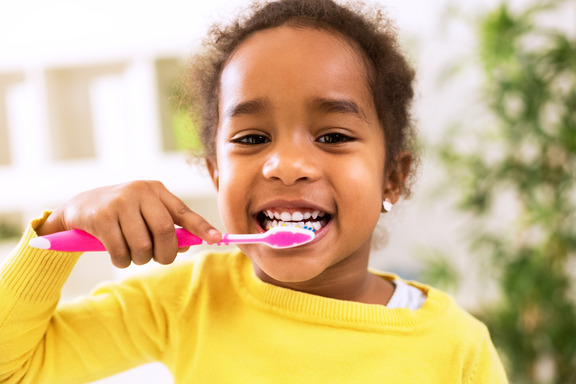How Praise Can Encourage Better Dental Hygiene in Kids
December 10, 2024

As a parent, one of your many responsibilities is teaching your child basic self-care habits, such as brushing their teeth. However, many parents find it difficult to get their kids to clean their mouths thoroughly. A study published in 2021 suggests that praising children while they brush their teeth can positively impact their commitment to the habit. Read on to learn how expressing the right kind of encouragement can foster better dental hygiene in young children.
How Does Praise Influence a Child’s Dental Routine?
A study conducted between 2019 and 2020 examined how praise impacts a young child’s persistence in completing tasks like brushing their teeth. The research involved eight children, ages one to three, whose parents recorded their nightly oral hygiene routines over two 16-day periods. During these recordings, parents allowed their children to brush as long as possible before stepping in to assist.
To encourage their kids, parents used different types of praise, categorized as:
- Process Praise: Acknowledging effort, such as “Good job!”
- Person Praise: Directing praise at the child’s identity, like “Good boy/girl!”
- Other Praise: General positive reinforcement, such as “Nice!” or “Very good!”
Additionally, parents engaged in other interactions like singing, reading, pretend play, or giving instructions to help guide their child through the process. They also completed daily surveys noting their stress levels, their child’s mood, and sleep patterns.
What Are Some Key Findings from the Study?
The results revealed that a child’s willingness to brush their teeth was significantly influenced by the way their parents communicated with them. On days when parents used more praise and fewer instructions, children tended to brush for longer periods. Moreover, process praise (focusing on effort rather than identity) was more effective than personal praise in encouraging kids to persist in their brushing routine.
While this study was conducted with a small sample size and did not account for variables such as socioeconomic background, location, or education levels, it provides valuable insights into how parental interaction shapes a child’s approach to self-care tasks. Further research is needed to understand how factors like sleep and mood influence a child’s ability to develop consistent hygiene habits.
How Can Parents Use This Information?
If your child struggles with brushing their teeth, incorporating positive reinforcement can make a difference. Instead of focusing on instructions or corrections, try:
- Offering process praise by acknowledging their effort (“You’re doing a great job brushing your teeth!”).
- Keeping a positive and encouraging tone rather than emphasizing mistakes.
- Making the activity fun with songs, stories, or games.
By using praise strategically, you can help your child develop strong dental hygiene habits while making the process more enjoyable for both of you!
About the Practice
At Midland Kid’s Dentist, we understand dental visits can be nerve-racking for both kids and parents. That’s why we create a comfortable, welcoming environment with personalized care. For more tips on how to encourage better dental hygiene in kids, don’t hesitate to contact us. Visit our website or call (432) 315-0195.
No Comments
No comments yet.
RSS feed for comments on this post.
Sorry, the comment form is closed at this time.
